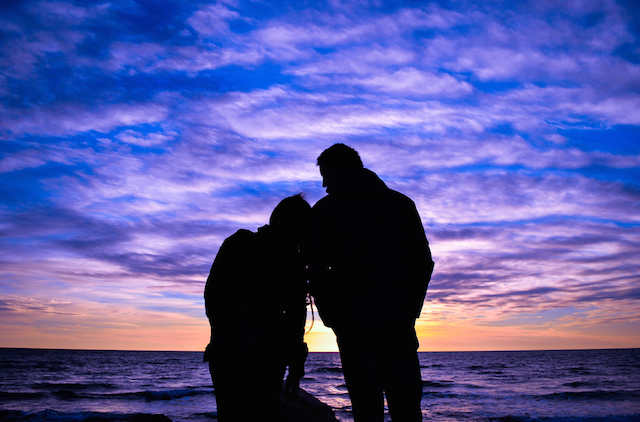
“Some people come into your life as blessings. Others come into your life as lessons.” ~Mother Teresa
Going by experience, I should have been petrified of men and marriage.
Forced into an arranged marriage at twenty, something that is common in India, it took me over a decade to draw up the courage to leave a toxic, abusive situation and to chart my own path in a conservative society, with two little kids to fend for.
But due to an inner conviction in the workings of a larger universe, I somehow made it through with my sense of wonder (and humor) alive.
Despite the social stigma, the day-to-day struggle of being a single mom, and the hardship of my first full-time job, I was driven by hope, not fear. When I look back at those difficult, grey years now, I see the magic, not the misery.
Because, you see, I was optimistic when it came to life and love. A voice inside me constantly said, “Life is meant to be joyful. Relationships are meant to make you whole.” I was convinced that my first experience had been an exception, not the rule.
On cue, I met a man who expected his woman to be strong, independent, and to take care of herself. He expected an equal partner, not a legal slave.
We had a torrid romance with no thought whatsoever of the future, and then decided to marry like good Indian folks (and save on the rent).
And so, it’s the vows of matrimony again for me. But this time, I am not the blind, impotent, self-styled victim of the first time around. Every day brings with it lessons—wholeness is a process, after all—as well as blessings.
Here is what I have learnt about love and relationships.
Accept everything.
There’s a lot that comes along with a committed relationship besides a new nameplate on the door. Hers is the face you see first thing in the morning when you wake up. His is the mess in the kitchen you clean up after he’s done making fish curry. Hers is the laptop that is never put on charge until you do it.
What’s the solution? Acceptance. What you resist persists, and what you accept doesn’t bother you anymore.
Accept your partner, wholeheartedly, warts and all, for better or for worse.
I used lessons learnt from motherhood and applied them to my relationship with my life partner. Like my child, no matter what my husband does, he is mine after all. Love is best served unconditional.
Honor yourself.
Keep in mind there is a difference between accepting your partner and accepting abuse.
I walked out on my first husband because I could not accept him as the man with supreme spiritual and legal right over my body and life. In a healthy relationship, both people feel empowered and free.
Respect who you are, your dreams, and your passions. Do not compromise on any of them. Only when we respect and honor ourselves can we truly respect and honor others.
You’re potatoes in a sack.
Relationships and living together cause friction, like potatoes rubbing up against one another in a sack. But the thing to remember is that the bump and grind serve an important purpose; they polish us, peel the dirt off our beings, and clean us out.
Every time your partner behaves in a way that bothers you, use it to search where in your being your anger begins. Every time your partner hurts you, use it to discover your deepest sore spots. Your partner is just the trigger; the anger or hurt is already within you, craving to be heard.
Kids and partners and parents can be irritating to live with, but we must be grateful for the opportunity they give us to become cleaner, shinier versions of ourselves; to uncover our oldest suppressed wounds; and to rid ourselves of them once and for all. (Of course, nothing is permanent but let’s save that for another post.)
Your partner is a reflection of you.
This is a difficult lesson to learn: that your partner is a reflection of who you are. In that case, I must have been a terrible person in my first marriage and I must be a very admirable person this time around.
But, no. I’m the same person. What has changed is the way I see myself.
Our relationships aren’t about our partners. They’re about us. We make happy marriages when we are happy people, when we love ourselves, when we respect our own needs and desires.
We make unhappy marriages when we’re bruised inside, when we devalue ourselves, and when we abuse our own sacredness.
So the most significant way of ensuring a long, happy love life is to love yourself first, above all else.
We do not become whole because our partner is in our life. On the contrary, our partner is in our life because we are whole. (And because wholeness is a process, our partner then makes us more whole. Go figure.)
Love is a verb.
Love is hard work. Love is gritting your teeth because he left the toilet seat down, shaking your head because the bills weren’t paid on time, clenching your fists because she is immersed in his phone during ‘us-time’—and then forgiving it all because you know you’re not perfect either.
Love is giving your best shot, showing up, being there, hugging for no reason, making up after a fight, and doing the laundry in the middle of the night. Not because you have to, but because it’s yet another way of demonstrating your love, and you just can’t get enough of those.
A decade ago, I walked out of a toxic relationship, stoically seeing it as a lesson I needed to learn. Today, I count both my relationships among my blessings—the bad one taught me to value the good one.
That’s the thing about love: it starts from within and works equally in all directions—ourselves, our lovers, our families, our exes, our friends, our past, our future. When we open our hearts to love, love opens the world to us.
Couple silhouette via Shutterstock
About Aekta Kapoor
Aekta Kapoor works with one of India’s largest media houses as editor of their fashion website. She lives in New Delhi with her husband and two daughters, and blogs at 100paths.com. Follow her on Twitter @AektaKapoor.













 Though I run this site, it is not mine. It's ours. It's not about me. It's about us. Your stories and your wisdom are just as meaningful as mine.
Though I run this site, it is not mine. It's ours. It's not about me. It's about us. Your stories and your wisdom are just as meaningful as mine.
Aekta, I’m sorry that your first marriage was the way it was, and I’m so pleased that you found the right partner for you further down the line, but I take exception to your writing, “a man who was an exception in the landscape of Indian men” – as someone who’s grown up in India, to parents who met via an arranged marriage (and who are the most blissfully in-love couple I’ve ever seen), as someone who is married (by choice, not arrangement) to an Indian man, I’m sure you understand that tarring the men of an entire nation based on a smaller sect of the population is terribly unfair. Misogyny, sexism, and plain-awful men exist everywhere, on all continents. I have dated English and American men (well, two and one, respectively) who have been wonderful, kind and humourous, and one who was chauvinism personified (that relationship ended quickly). I have had Indian boyfriends who are all sorts of things, like men all over the world, and I cannot typify any of them based purely on their ethnicity. I know some men in India I’d rather not, but I also know so, so many who are kind, funny, witty, accepting and encouraging of their partners, wonderful, wonderful men, and you do them all a disservice by propagating the stereotype.
Your lessons in love are valid, and wonderful to share, but another lesson might be to consider your own judgement, and think about how much of those you’re foisting on others.
With warm wishes.
Point noted, VV. I could only share my own experience of Indian men and what I see around me, not those around the world. But you are right. There are all kinds of people everywhere. And we all change over time. I shall keep your words and experience in mind. Thank you for sharing. 🙂
I cried. Thank you for this.
This, like many posts on Tiny Buddha, appeared at the perfect moment. Last night, I had a realization that I judge my husband’s actions by my desires rather than by his motivation. And I interpret his actions based on my feelings, thoughts, and history versus considering what it means from his background. It meant that when I got offended by an action on his part, I paused for a moment to reflect and make a special effort to view the situation from his pov and I think my response was much more gracious and loving than it has been in the recent past.
This was what spoke to me the most, “Every time your partner behaves in a way that bothers you, use it to search where in your being your anger begins. Every time your partner hurts you, use it to discover your deepest sore spots. ***Your partner is just the trigger; the anger or hurt is already within you, craving to be heard***.”
That.. that is my desire, to understand what moments of anger or hurt need to be acknowledged so my current relationship may continue to grow unimpeded by echoes of the past. He is deserving of my best not my worst but he has proved able to weather my worst as well.
I am just recently realizing this and working on myself….and after reading this from Tiny Buddha,,, I realize that it’s all about perspective..understanding that we all make mistakes, this type of mindset can help me gain a stronger understanding and perspective about what is really going on. I have been trying to learn to pause…
You can say that again… It is a daily process and I think we are blessed to have the opportunity. Thank you for sharing 🙂
What a lovely note. Thank you for sharing 🙂
I can relate to this. Great article! Wish you all the very best and success. Remember, you were created for more than what you’ve settled for. 🙂
Hello. My husband of almost 7 years, cheated on me and left me for her and is living with her now. He said he hasn’t been happy in years but never told/showed me he was unhappy. We have a 4 year old son that missed his daddy so much and cries for him to just come home. Our son even crawled all over his car crying “daddy stay home with me.” And he still left. He just keeps saying “he’s never coming back, no matter what.” I didn’t know what to anymore..he left me 5/7/15, the weekend before mothers day this year and it dbroke my heart and I keep praying to God and he keeps telling me “be patient” I was still trying my best but it was hard when this was hurting my son so badly. I have told my sister about this and she gave me some advice to contact a very good and powerful prophet who can help me pray for my husband to come back and be happy with us again which i did and i contacted the prophet. he prayed for me and my husband cam home begging me to take him back and now we are happily living together and a family. all thanks to the prophet and his email is (prayerstosaverelationship@yahoo.com). May God bless you abundantly!
Thank you Jay 🙂
I’ve been freelancing from home for some time now, doing some basic jobs which only required a computer and internet connection and it’s been a life-saver for me… Six months have passed since i started this and i got paid so far in total 36,000 bucks… Basicly i profit about $80 each hour and work for 3 to 4 hrs most of the days.Best part to whole this thing is that you get to choose yourself when to work and for how long and you get paid at the end of every week
like me coming …. < Start working at home with Google! It’s by-far thss best job I’ve had. Last Wednesday I got a brand new BMW since getting a check for $6879 this – 8 weeks past. I began this 8-months ago and immediately was bringing home at least $155per hour.
I work through this link………
>/
Extra 74$ daily@@ tiybuddha
>/
i like me tiny …. < Start working at home with Google! It’s by-far thss best job I’ve had. Last Wednesday I got a brand new BMW since getting a check for $6878 this – 8 weeks past. I began this 8-months ago and immediately was bringing home at least $188per hour.
I work through this link, ——— < www.NetCash9.Com a
—————————
Dear Aekta thank you! one of the best posts I’ve read for awhile. So beautifully written and shared from your genuine and blossoming heart. Clearly you’ve come such a long way and your openness with your heart to learning and growth has seen you emerge from suffering and transformed into a butterfly. Such a balanced understanding and cultivation of true love… totally enjoyed reading your post, hope to maintain my own wholeness and true love processes as well as you do 🙂 Indeed they are processes, never static, ever evolving, just like we are. Many Love and continued Blessings sent your way xo namaste.
Extra 77$ daily@@ tiybuddha
>/
Thank you for the lovely message Patsie 🙂
Thank you for sharing Aekta, your post couldn’t have come at a better time! Deep, amazing thought provoking insights on love and life. Love is delicate and complicated but if we understand our value and ourselves love begins to unfold the way it was meant to be. cm.
I like this description: ‘Delicate and complicated’. So true! Thank you!
i strongly object to generalization here about Indian men. You still seem too negative about your experience? What does it mean to have such a negative view? You are maligning men of an entire nation..feminism stretched too far?! You seem to be an exception in a land of wonderful men and women
I am sorry if I have offended anyone or if I seem to be maligning a group of people. I am merely sharing my true experience and that of the people around me. It is my destiny to have faced the kind of experiences I did and many women still do, not just here but everywhere in the world. It is also true that India is a wonderful place to be born and I wouldn’t want to live anywhere else. As Gretchen Rubin says, the opposite of a great truth can also be another great truth.
Thanks for your reply. I too tend to get emotional around this topic based on my experience.
I am in Indian and a man who followed traditions of an arranged marriage. I was supportive to my wife, helped her relocate to US, paid for her education and took care of kids. I loved her and tried to be what I expect of a partner in a relationship.
Little I knew that I was never her ideal soulmate. In the earlier part of relationship, she had a secret affair with her ex that she remained emotionally connected to despite our marriage.
I forgave her and we tried to build relationship again. After a kid, just when I was comfortable enough, she got into affair with a Caucasian person and decided to step out of marriage so that she can marry him. She said she never felt special with me, new guy is attractive and is what she had desired / dreamt since she was teen. She filed for divorce, claimed child support and custody and never cared paying debt I took for her education etc. She even claimed house that I had owned before I was married. And in order to expedite divorce threatened me with filing 498A.
So please stop generalizing Indian women a victim of conservative society. City bred women are educated, independent, not very respectful of culture and sometimes even abuse rights and laws that have been set up to take care of weak.
I have decided not to however let this incident affect my future. I still harbor in my heart image of my partner as a loving person who believes in being one with me. I am not going to give into my bad experiences and judge Indian women through those glasses.
KS, I am very sorry to hear this. Yes I have heard many such instances in India as well. In fact, there are many new changes happening currently to 498A to prevent its abuse. The laws are incomplete and open to loopholes — there is no way for people in bad marriages to leave unless they establish that it is the other person’s fault. And it can get very ugly when one person wants out, and the other wants to hold on.
I wish you all the best and I hope you’re able to look back one day and see all this as a blessing in disguise.
Dear Aekta, thank you so much for sharing. Your words resonated with me. I have a question I have been struggling with for sometime now. How do I know if I am being unreasonable when demanding respect for my independence and boundaries and when I am simply respecting and loving myself? I ask because my mate feels that I am unreasonable when I will not do something desired by her simply because she “wants me to” if it does not align with what I feel comfortable doing. I will compromise but my no means no. I am a firm believer in free will and believe that all decisions even a decision to give in should come from the giver freely. This results in many arguments because we view our roles in a relationship so differently. I want the relationship to work and I love her deeply but I do not feel I should have to compromise on my own self. Any insight will be appreciated.
The choice is clear when you know who you are. The first thing is to know who you are. Then comes expressing it in a non-threatening way. Then comes dealing with the consequences of it. It is not always easy being true to yourself.
Thank you for replying
Thank you for sharing your personal experience. It is true that our negative experiences often make us grateful for the good. I completely understood you weren’t generalizing about all Indian men, and thought this was a thought provoking article about using our negatives to appreciate our positives. Thanks again.
Thank you!